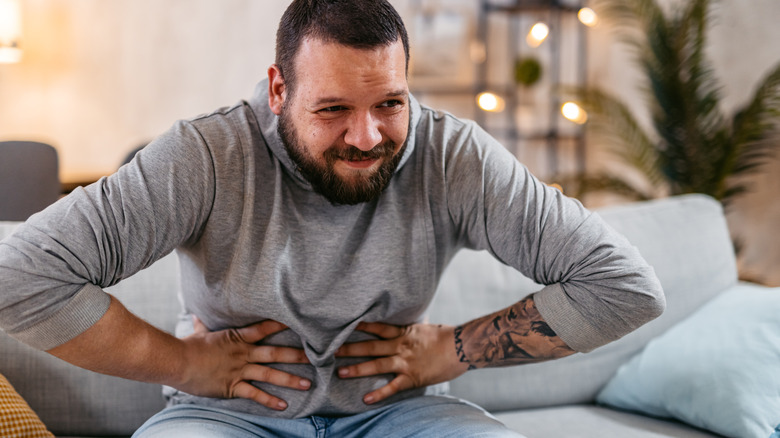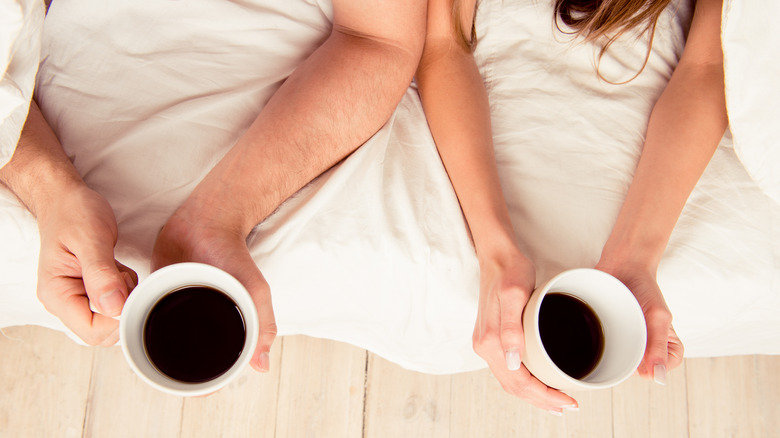One Reason You Shouldn't Drink Coffee Before Sex (And One Reason Why You Should)
When it comes to sex, there are a few things each of us might do to prepare (when we have the time). Whether that's grooming your nether regions and doing some light stretching or putting on some sensual music while you slip into a bath, the choice of activities varies depending on what makes you feel relaxed and in the mood.
Food and drink can be a topic of interest too. You may have learned from trial and error that you should avoid eating this type of vegetable before having sex. Or perhaps it's about limiting your alcohol intake. Speaking of beverages, coffee has an interesting bit of science attached to it when it comes to sex. While some experts recommend avoiding the popular morning drink before intimate time with your partner, others actually think it might help in the bedroom department. On the "nay" side of things, it has to do with the real reason why coffee makes you poop: its natural bowel-stimulating effect.
Coffee could cause digestive distress for some people
Caffeine and coffee acids, such as chlorogenic acid and N-alkanoyl-5-hydroxytryptamide, can cause digestive discomfort in some people. Caffeine works by increasing the frequency of contractions in your gastrointestinal tract. This is why a lot of people turn to the beverage as a natural stimulant that helps them stay regular.
However, for people with sensitive guts, this can become problematic, especially before sex. Not everyone digests coffee the same way. For some people, like those who have gastritis, the increase in contractions along with an increased production of stomach acids can cause symptoms like heartburn. Still, others might find that drinking more than two cups of coffee or strong doses of caffeine could lead to diarrhea.
People with gastroesophageal reflux disease (GERD), irritable bowel syndrome (IBS), or anxiety may also have to be mindful, per Dr. Kyle Staller, a gastroenterologist at Massachusetts General Hospital and assistant professor of medicine at Harvard Medical School (via Bon Appétit). Coffee can exacerbate your symptoms and take away from the sensual activity you were looking forward to indulging in. Plus, what you put in your coffee matters, too. Dairy intolerance can cause symptoms like gas, bloating, and diarrhea. (Speaking of gas, it's the reason why you should avoid eating this popular protein before sex.)
Now, on to the more positive effects of consuming coffee before sex.
Drinking coffee before sex might make the activity more pleasurable
There are various claims about how coffee can boost your libido, enhance orgasms, and prevent erectile dysfunction. While some are backed by science, others don't necessarily fall into that category. Let's take a look.
"It is possible [that] caffeine could enhance sexual arousal," shared sexual psychophysiologist Nicole Prause (via MDLinx). But this could be due to the same reason why caffeine perks you up in the mornings — it jolts your nervous system awake and makes you feel alert and energized. Sex requires a certain level of stamina and athleticism. A pre-coitus cup of coffee can help in that department. Additionally, according to a 2012 study published in Nutrition Journal, regular consumption of coffee was linked with higher testosterone levels in men. Low testosterone levels are typically associated with low sex drive. Furthermore, according to a 2015 study published in PLOS One, men who drank 2 to 3 cups of coffee daily had reduced odds of prevalent erectile dysfunction (ED).
The notion of heightened orgasms with coffee, popularized on TikTok, is a nuanced one. While some experts don't think caffeine can deliver such results, others see possibility. National Health Service surgeon Dr. Karan Rajan shared that when consumed in low doses, coffee narrows your blood vessels, also called vasoconstriction. The opposite is true for large doses. "It widens the vessels and improves blood flow. Arousals and [orgasms] are largely based on the amount of blood flowing to your crown jewels." Even so, this isn't backed by hard science, stated the expert.


